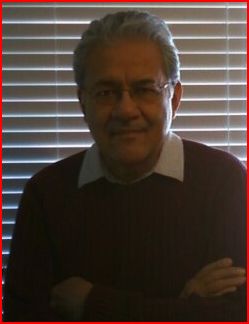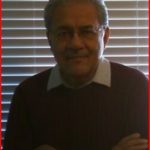
By Leonard Adame
 My father fought professionally. He weighed 118 pounds in his prime, but he hit like a middleweight. He always was a brawler, going to dances in the 1930s and picking fights in the classic ballrooms of the times: The Rainbow, The Casadome, The Marigold. Big bands played these venues in that time, and people, unlike now, dressed up in suits, shiny wing tips, tight, low-cut black dresses, patent leather heels, stockings with seams, and aftershave, perfume and jewelry that would have made Revlon and Chanel jealous.
My father fought professionally. He weighed 118 pounds in his prime, but he hit like a middleweight. He always was a brawler, going to dances in the 1930s and picking fights in the classic ballrooms of the times: The Rainbow, The Casadome, The Marigold. Big bands played these venues in that time, and people, unlike now, dressed up in suits, shiny wing tips, tight, low-cut black dresses, patent leather heels, stockings with seams, and aftershave, perfume and jewelry that would have made Revlon and Chanel jealous.
But the duds didn’t matter much to my dad. He wanted to fight, to challenge the baddest of the bad. And he did. He always won. And as I grew up in Fresno, every so often I met one of my dad’s victims, guys who sneered at me and said, “Your ol’ man ain’t shit.” Of course, the person never said that to my dad.
But even before he lived in Fresno, my dad lived in Buckeye, Ariz., where he began his pro boxing career. Again, he always won. And he got the attention of John Henry Lewis, a former champion who became a trainer. And he was a Black man. This is funny, because my dad wasn’t fond of Black people, and neither was his brother. But under Lewis’ tutelage, my dad became unbeatable in all of his pro fights.
Alas, my grandmother, afraid he would become punch drunk, stopped my dad cold from boxing, literally. He was getting ready one day for a big fight in Los Angeles. My grandmother refused to let him go. They argued, she lost her temper, and she grabbed a small piece of firewood and knocked him out so he couldn’t catch the train. She was barely five feet in stature and didn’t weigh much more than my dad. But she did what no other fighter he faced could do: knocked out my dad. She regretted that action for a long while, saying she hadn’t meant to hurt him. As he told me this story, I thought maybe Lewis could train my grandmother too.
Just before WWII, my dad, having retired from boxing, got a job at Chrisman’s Diner at Olive and Van Ness in Fresno. The place is now a muffler shop. It was at Chrisman’s where a Black cook hired my dad and taught him short-order cooking. So my father had another Black mentor—even though he didn’t like Blacks. He learned well, however, and when he was drafted, the Army Air Corps decided to make him a full-fledged chef. And again, he was taught by a Black man.
When he told me these stories, I asked the obvious question: “If you didn’t like Blacks, why did you let them teach you stuff?”
He answered that he had no choice, so he put up with it.
When Martin Luther King, Jr., appeared on the scene, my uncle said that it was a shame they gave him so much public attention because Blacks might get the idea they’re better than Mexicans. This from a man who got into it with Blacks at Edison High School on Fresno’s west side. My dad too didn’t think much of King and other Black civil rights leaders. In fact, he said Blacks can’t think like other people and that they can’t be counted on in a fight.
During this time, Muhammad Ali was tearing up the boxing world. When he knocked out Sonny Liston, Ali became my hero though I didn’t tell my dad this. But I had just started high school and I needed a hero. My high school years were melancholy, and I later realized in college why: Racism had kept me off the football and baseball teams even though I excelled in Little League and Babe Ruth.
I couldn’t see or articulate the subtlety of the racism of that time. And maybe as a result of that, I hooked on to Ali because he was outspoken and accurate about the effects of racism, which, of course, awakened my consciousness. And Ali always backed up what he said about knocking out people. Beautiful!
It was a natural progression for me to also latch on to the civil rights movement of the 1960s. And soon King and Malcolm X also became people I greatly admired.
A few years after that era, my dad became a great grandfather after his granddaughter married a Black man. Suddenly, it seemed, there was a little half-Mexican, half-Black baby crawling around the homestead. As things do, it came to pass that he loved his granddaughter mightily. And even my uncle came to love this little girl too. Amazing what kids can do to stubborn old guys.
Neither of these two old warriors ever admitted that their feelings against Black people were wrong. But I like to think that my multicultural education and my little grand niece did much to change their minds. But thanks to Ali and Rosa Parks and King and Malcolm, things changed in my family. My own prejudice more and more eroded away, and my dad and uncle expressed fewer racist comments.
During this time, of course, Cesar Chavez and Dolores Huerta entered the mix and my education was complete. Because of these activists, I learned a different history, a different way of thinking and acting. I learned more about the commonality of human beings and that in the end we all have to change ourselves to be more humane and accepting.
Still, I think it was harder for my dad to evolve given the times he lived in. But I also want to believe that he did. And, of course, he taught me many things about survival in a racist world because he, ironically, had been the victim of racism when he came to this country.
He survived those things. And I have too, especially since doing so in those days, his and mine, it didn’t hurt at all that he schooled me on how to throw a mean right cross followed by a vicious left hook to the ribs.
These skills, including a multicultural education, are formidable tools, and they sure as hell helped me to learn and teach the principles of equality.
*****
Leonard Adame has retired from teaching college English. He now plays drums in various bands, takes photographs, reads mystery novels to a fault and has published poetry in college anthologies. He most enjoys re-learning about human beings from his grandkids. Contact him at giganteescritor@hotmail.com.
